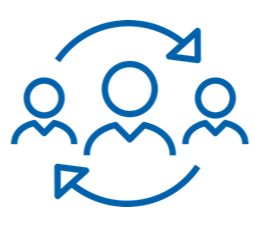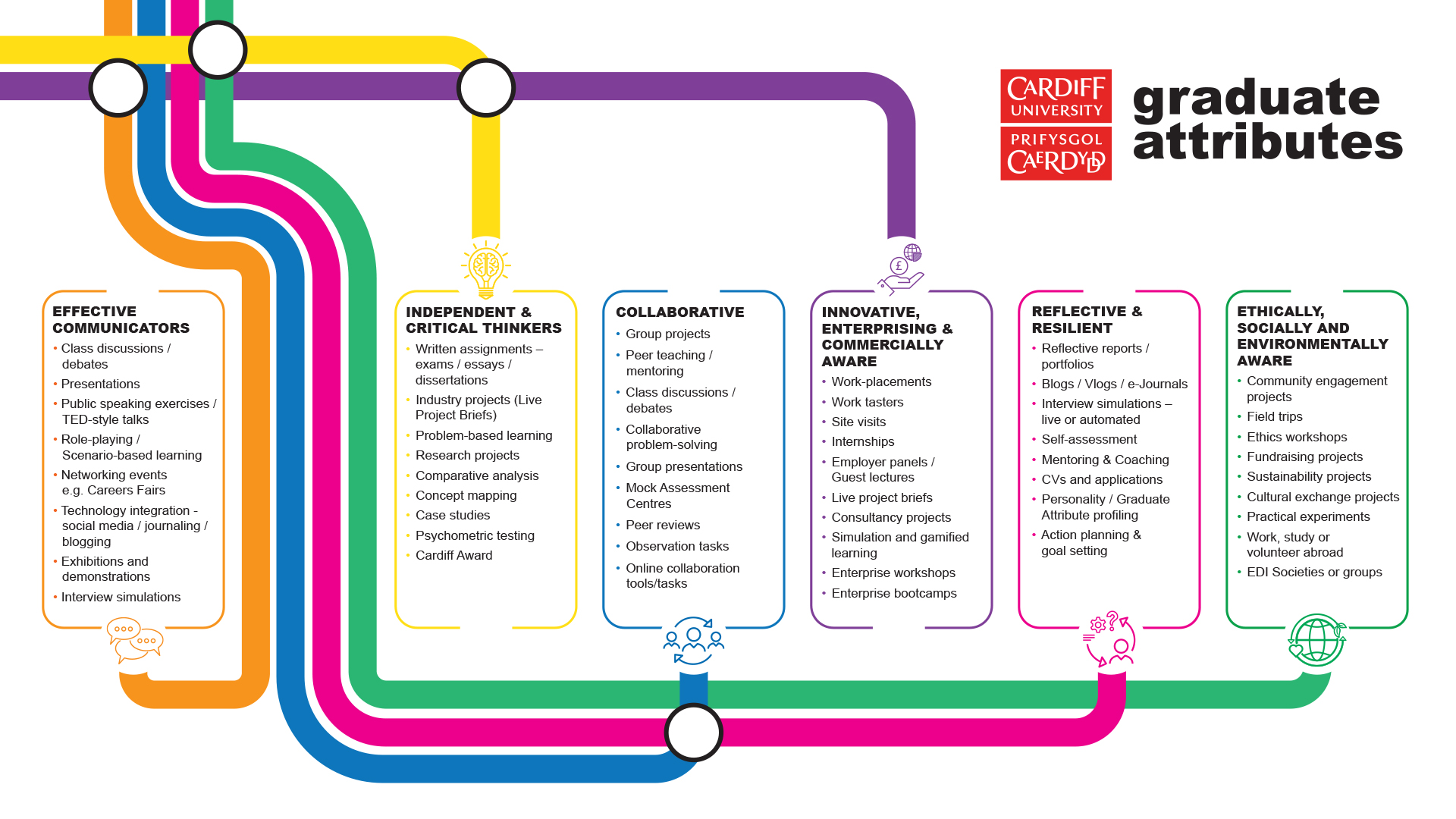Graduate Attributes
Exploring the university’s Graduate Attributes and why they are important for the future success of our students.
The Graduate Attributes have been:
- Commissioned by Pro Vice Chancellor for Education and Student Experience as part of the development of the Principles of Programme Design.
- Developed by Student Experience Strategy Group (SESG) working group, based on the attributes for the Cardiff Award, updated in consultation with Schools.
- Incorporated into the Institutional Expectations for programme structure, design and delivery.
When developing new programmes and making changes to existing programmes, Schools will be required to show how they have integrated opportunities for students to develop these attributes through the design of their programmes.
Introducing the Graduate Attributes
The Graduate Attributes are a set of transferable skills and capabilities that Cardiff University has developed in partnership with students, academics and employers. These attributes are intended to be a golden thread running through every student’s time at Cardiff and can be developed through their studies and via extra-curricular opportunities in their School, and across the wider university. By developing the attributes, students will maximise their chances of securing graduate-level employment as social, economic and environmentally aware global citizens.
This video provides a short introduction to the Graduate Attributes:
Access the graduate attributes video transcript here.
The Cardiff University Attributes are:
|
Collaborative |
Effective Communicators |
Ethically, Socially and Environmentally Aware |
Independent and Critical Thinkers |
Innovative, Enterprising and Commercially Aware |
Reflective and Resilient
|
Access the GA icon images as .png files if you would like to add them to any information, promotional or marketing material e.g. module handbook.
Collaborative
C1 Contribute positively and effectively when working in a team, having an impact from the outset.
C2 Demonstrate enthusiasm and the ability to motivate themselves, and positively influence others in meeting agreed responsibilities.
C3 Be respectful of the roles of others and acknowledge the limits of their own skills/experience.

Effective Communicators
EC1 Listen to and take account of the views of others.
EC2 Communicate complex ideas effectively to diverse audiences.
EC3 Contribute to discussions, negotiate and present with impact.
EC4 Deliver, accept and act on constructive feedback.
EC5 Take a professional approach to communication, including their own online or social media profiles, and be alert to how words and actions may be interpreted by others.

Ethically, Socially and Environmentally Aware
ESEA1 Consider own personal and professional ethical, social and environmental responsibilities.
ESEA2 Demonstrate personal and professional integrity, reliability and competence.
ESEA3 Understand organisations, their stakeholders and their impact on the community.
ESEA4 Actively take responsibility for promoting human rights, celebrating diversity and widening inclusion.
ESEA5 Be mindful of the Climate Emergency and the UN’s Sustainable Development Goals.
ESEA6 Act as global citizens, engaging with and valuing cultural difference through practical experience of other countries.

Independent and Critical Thinkers
ICT1 Identify, define and analyse complex issues and ideas, exercising critical judgement in evaluating sources of information.
ICT2 Demonstrate intellectual curiosity and engage in the pursuit of new knowledge and understanding.
ICT3 Investigate problems and offer effective solutions, reflecting on and learning from successes and failures.

Innovative, Enterprising and Commercially Aware
IECA1 Generate original ideas and apply creative, imaginative and innovative thinking in response to identified needs and problems.
IECA2 Take the initiative to act on own ideas and the ideas of others, balancing risk and returns and making things happen.
IECA3 Be confident in pursuing entrepreneurship as a viable and rewarding career path.
IECA4 Understand organisations, their stakeholders and their impact on the economy.

Reflective and Resilient
RR1 Actively reflect on own studies, achievements and self-identity.
RR2 Demonstrate resilience, adaptability and creativity in dealing with challenges, and be open to change.
RR3 Identify and articulate own skills, knowledge and understanding confidently and in a variety of contexts.
RR4 Engage with new ideas, opportunities and technologies, building knowledge and experience to make informed decisions about own future.
RR5 Set aspirational goals for continuing personal and professional development, planning effectively with a commitment to lifelong learning.

The importance of developing Graduate Attributes
Graduate recruiters state that students often have a wealth of achievements and experiences that they are not able to articulate in their application or during an interview.
The last two years have shown that attempting to predict the future is a risky business. What we can say with some certainty is that undertaking a university degree undoubtably helps graduates develop essential skills that will equip them for success in the future. The challenge often lies in students’ recognition and articulation of their skills, which is where extracting and surfacing the employability value of degrees, authentic assessments that mirror the working world and opportunities for interaction with employers (either extracurricular work experience or embedded in the curriculum), can help.
Embedding the Graduate Attributes into the student experience provides opportunities to develop and enhance the necessary skills and attributes highly sought after by employers. Surfacing the Graduate Attributes will enable the student to identify, apply and discuss these with increased confidence during the recruitment process.
The Graduate Attributes will also help to achieve one of our strategic priorities ‘Co-creating futures’, where the University commits to offering:
Flexible, tailored, lifelong learning to our students that gives them choices, agency and a voice, and provide future-proofed knowledge and skills that they can apply in the real world to fulfil their career aspirations. Our students will be resilient, critical, problem-solving, change makers who know how to work together in an uncertain, interdisciplinary, cross-sectoral, digitised world.
Embedding the Graduate Attributes
Recognising that students are often balancing a range of competing activities, including studying, work and caring responsibilities, the Student Futures Framework supports two broad approaches to embedding employability:
- Via curricular activities – the employability activity is delivered as part of a credit-bearing element of the student’s programme of study (e.g. an employability activity utilised as a form of authentic assessment for a module, or a work placement undertaken as part of a professional placement year).
- Via extracurricular activities – the employability activity is delivered outside of the credit-bearing elements of the student’s programme of study (e.g. participation in a skills workshop, or attendance at an employer presentation).
Many of the attributes will already be embedded in your programmes and modules, they just need to be explicitly highlighted to students.
Click on the image below to see a range of curricular activities that could be taught, practised and or assessed to facilitate the development of each attribute.

You can download this infograph and access the graduate attributes activities infographic transcript.
Request an accessible format
If this document cannot be read by your assistive software, you can request an accessible version by emailing mailto@studentfutures@cardiff.ac.uk and reference the Learning Resources Team. Please include the assistive tools you use and the format you require.
Graduate Attributes Map
To support staff in making graduate attributes and skills development more explicit to students, Student Futures can work with programme teams to develop a student-facing Graduate Attributes Map. These Maps are developed on a website tailored to your programme and designed to explicitly highlight to students how they can develop each attribute via curricular and extracurricular activities.
View our Graduate Attributes Map template
Built on an open-source website, Graduate Attributes Maps can be used as a promotional tool to prospective students at Open Days and Offer Days. They can be useful for Personal Tutors supporting career-related discussions and helping to signpost students to the most relevant services. They can also be useful in demonstrating to external stakeholders how your programme is pro-actively addressing employability and employer demand, developing students with the skills and attributes to succeed in the world of work.
Typically, a Graduate Attributes Map is created post programme approval and revalidation, but if you are interested in developing a Map for your programme, please contact your College Business Partner.
AHSS Jon Forbes ForbesJ3@cardiff.ac.uk
BLS Joanne Jenkins JenkinsJ6@cardiff.ac.uk
PSE Llinos Carpenter CarpenterL1@cardiff.ac.uk





